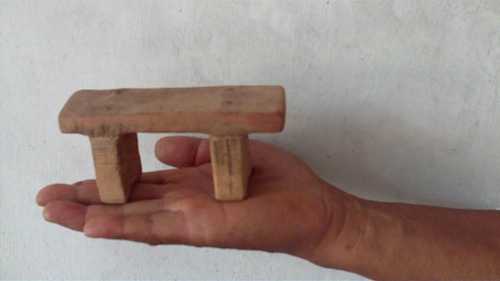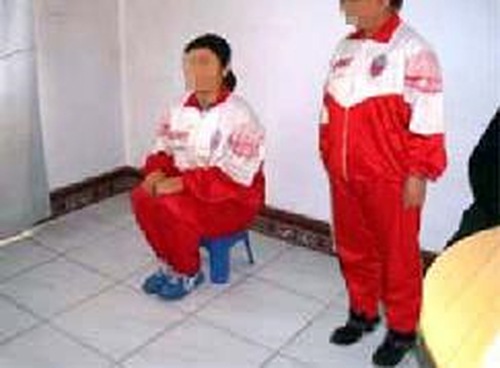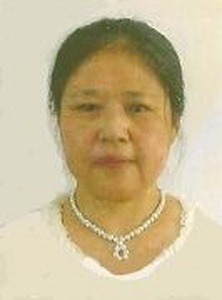(Minghui.org) A mother and daughter in Tahe County, Heilongjiang Province were arrested on March 25, 2019 for passing out informational materials about Falun Gong. Ms. Song Chunyuan was sentenced to four years with a 20,000-yuan fine, and her daughter, Ms. Wu Dan, was given one year and fined 10,000 yuan.
As they previously couldn’t afford to pay for the court fine, Ms. Wu had to borrow money around to pay for it after she was released in 2020. She was arrested again in September 2021 and detained for a week.
Ms. Song is still serving time at the Heilongjiang Province Women’s Prison. As a result of the long term persecution, she has begun to have falling teeth, receding gums, systemic edema and pain.
Falun Gong, also known as Falun Dafa, is a spiritual discipline that has been persecuted by the Chinese communist regime.
Health Improves After Practicing Falun Gong, Later Jailed for Not Giving It Up
Ms. Song, 65, is a retired railroad worker. She had a major workplace accident in 1975 when she was only 19. She suffered severe brain injury and damage at the thoracic and lumbar periosteal, and joint dysfunction, as well as her kidneys. Her complications included incontinence, which developed into uremia.
After the accident, Ms. Song searched long and hard for treatments that could alleviate her suffering. Her conditions, coupled with the financial burden of paying for her treatments, brought tremendous anxiety and pressure to her family. She underwent several major surgeries, which left a nearly foot-long scar.
Ms. Song ended up spending more than 100,000 yuan on her treatments. This placed a huge financial burden on her family and her workplace.
In 1998, Ms. Song was introduced to Falun Gong and within one month, the ailments she had suffered for years – stomach diseases, cholecystitis, cervical spondylosis, arthritis, uremia – all disappeared.
For upholding her faith, she was previously arrested five times, given three years of forced labor in 2003 and sentenced to four years in 2011.
Tortured in Heilongjiang Province Women’s Prison
Since the onset of the nationwide persecution against Falun Gong, the Heilongjiang Province Women’s Prison has been actively participating in the persecution. To force incarcerated practitioners to renounce their faith, guards selected ruthless inmates to torture them, by all means possible.
Initial Torture
When the practitioners were admitted to the prison, the guards searched their bags and clothes. Most of their personal items and clothes would be confiscated. Both Ms. Song and her daughter were assigned to the 11th ward (which was later renamed the 8th ward), but in different teams.
Before they could take a break after two days of travel to the prison, the mother and daughter were taken to have the required physical examination and body search. They, along with other newly admitted practitioners, were then taken to the warehouse or laundry room and forced to sit on a small stool or stand still, while being monitored by the inmates. Other inmates beat and verbally abused them at will, instigated by the guards.
If the practitioners refused to write a statement to renounce Falun Gong, they were deprived of sleep and denied restroom use. The relentless persecution made it feel like a living hell.
Sitting on a Small Stool
One of the most common torture methods was to force the practitioners to sit on a small stool. The seemingly harmless action turned out to be extremely cruel for them, as the stools had uneven surfaces, missing legs, or were so tiny that they could be placed on one’s palm.
The practitioners were often ordered to sit on such small stools for hours while keeping their backs upright, legs closed and hands on the legs. Any slight movement would result in beating by the inmates.
 The miniature stool used in the prison
The miniature stool used in the prison
 Torture reenactment: sitting on a small stool
Torture reenactment: sitting on a small stool
Because Ms. Song and her daughter refused to renounce Falun Gong, they were subjected to this torture. Just like many other practitioners, their buttocks festered and blood dried on their underwear.
Intimidation
As long as the practitioners refused to renounce Falun Gong, the guards threatened to jail them indefinitely and subjected them to sleep deprivation, starvation and physical abuse. Most of the practitioners were denied family visits or any correspondence with their families. They weren’t allowed to buy extra food or daily necessities, including toilet paper or menstrual pads.
Sometimes the guards held them in solitary confinement or tortured other inmates in their cells in order to incite hatred towards them.
The guards also forbade the practitioners from talking to each other. If they needed to use the restroom, the inmates would first make sure there were no other practitioners inside.
Poor Living Conditions
The living conditions in the prison were extremely poor. The guards usually arranged over twenty people to stay in a 36 square meter room (about 400 square feet). Smaller cells of about 10 square meters had at least 16 people living in them.
The bunk beds were closely placed next to each other, with extremely narrow spaces in-between. The bedding given to the practitioners often had excessive mold on it. Even if the practitioners were given clean bedding, other inmates would swap their old and dirty ones with the clean ones.
The heat was never turned on in the freezing winter in China's northernmost province. Many practitioners had frostbite on their hands, feet and ears.
In the summer, the heat made the cell like a suffocating steaming pot and the practitioners’ clothes were completely soaked. Yet they were still made to do unpaid labor.
Mosquitoes, flies and insects were everywhere, including on their beds. When the practitioners swept the floor every morning, the dead insects could fill up the dustpan.
During break times, the other inmates could walk around or chat with each other, but the practitioners had to stay in the cell and weren’t allowed to talk to anyone. Each one of them was closely monitored by several inmates, who would take things or their money at will.
The food quality was also extremely poor. The steamed buns were made with aged flour and sometimes had a moldy taste. The same was true for the rice.
Forced Labor
Except using the restroom, washing themselves or doing laundry, the practitioners and inmates stayed in the crowed cells all day long. The guards also arranged them to do unpaid labor in the cell. The working hours started at 4 a.m. and ended at midnight without any breaks. They were forced to have their meals on their beds without washing their hands, mostly still working as they ate.
Each one was given an enormous quota each day, which could barely be finished on time. Sometimes the guards woke them up at 2 a.m. to start a new day of work.
If anyone needed to use the restroom, they had to run back and forth to save time. If they couldn’t finish the daily quota, they would be beaten, verbally abused, and forced to stand for long hours. The inmates would also be denied from calling their families or restricted in buying daily necessities.
The guards at the 8th ward often ordered practitioners to do the jobs that other inmates weren’t willing to do. Most of the work involved working with toxic chemicals or materials.
The tinfoil that the practitioners worked with was quite toxic. Many of those who worked with it had systemic edema and swollen eyes. Some developed skin allergies and some threw up. It was so toxic that even the flower an inmate kept in the cell was dead. When the practitioners and inmates reported the situation to the guards, they responded that the tinfoil was made from rice and edible.
The practitioners also had to unload heavy bags of five by three feet of coffee stirrers and carry them into their cells on the fourth floor.
Practitioner Ms. Zhang Huijuan, who was in her late 50s and sentenced to 12 years, was ordered to do the same as younger practitioners. Due to malnutrition and heavy workload, she once fainted while walking to the building and was almost crushed to death by the crowd. After a brief break, she picked up the bag and carried it to the second floor, only to faint again.
After the practitioners finished making the products, they had to package them, carry the bags downstairs and load the truck before starting another round of work.
Both Ms. Song and her daughter were forced to do this intensive work, despite Ms. Song’s age.
Another type of work was to make fake eyelashes. Many elderly practitioners, including Ms. Wang Fenglan, 63, Ms. Bai Liyan, 61, Ms. Wu Yanhua, 59, and Ms. Zhang Huijuan, 59, were forced to do this, despite their declined vision. Even younger practitioners in their 30s and 40s began to wear reading glasses after doing the work for long periods of time. They also suffered intensive pain in their backs and necks as a result.
Other work the practitioners were forced to do included making paper boxes, envelopes, toothpicks and chopsticks. Some product packages said they went through high-temperature disinfection, when the reality was that they were made in the filthy prison cells without sanitation measures.
Brainwashing
In addition to the intensive labor, the practitioners were also subjected to brainwashing aimed to force them to renounce their faith. If they weren’t doing the forced labor, they would be forced to watch propaganda videos smearing Falun Gong and write “thought reports.”
Practitioners in the 8th ward moved to a new building on November 24, 2021. The younger practitioners were assigned to the fifth floor, while the elderly practitioners, those who struggled with medical conditions, refused to renounce Falun Gong or do the forced labor went to the six floor. The six floor, also the top floor in the building, wasn’t open to visitors, making the persecution more covert.
For practitioners who weren’t doing the forced labor, they were subjected to intensified brainwashing, including reading books, watching propaganda news and singing songs to praise the communist regime. Later on, they were ordered to attend brainwashing seminars or classes, as well as making public presentations to introduce themselves and slander Falun Gong. Those who refused to comply would be beaten, forced to sit on the small stool or subjected to other restrictions. The guards never showed up when the inmates tortured the practitioners.
Three inmates, including Yuan Jingfang, Wang Min and Sun Jing, were mainly in charge of brainwashing. Two guards, Yue Xiufeng and Guo Linlin, also held regular interviews or exams of the practitioners to check whether they still remained firm in their faith.
Financial Persecution
All the daily necessities used in the prison had to be bought by the practitioners or the inmates themselves. The items were much more expensive than market price and of lesser quality. For example, a polyester underwear was 22 yuan. A pound of apples, sometimes rotten, was also 22 yuan. Most other things such as toilet paper or soap were defective. Sometimes the guards gave out empty packages and still charged the money from the practitioners and inmates’ commissary accounts.
In extreme cases, the goods the practitioners paid for wouldn’t arrive until months or a year later. Refunds never happened. Even when the practitioners managed to get the supplies, they might be stolen by the inmates assigned to monitor them.
As Ms. Song was forced to divorce and lost her income due to the persecution, she relied on her sisters to provide for the living expense of her and her daughter in the prison.
Karmic Retribution
Inmate Tong Jinyan was sentenced to life for scam. She often got hold of various goods, including makeup, clothes and food, and forced other inmates to buy the items from her, profiting from dozens of yuan to thousands of yuan. She managed to make over 100,000 yuan this way.
Tong aggressively took part in persecuting Falun Gong practitioners, including beating and verbally abusing them. Even some guards feared her.
Although she received a term reduction by participating in the persecution, she developed uterine cancer and cervical cancer two years before her scheduled release. After the prison approved her medical parole, her brother, the only family member of her, refused to care for her due to her negative personality. She eventually died in the prison on November 28, 2021.
Related reports:
Recent Torture Cases of Falun Gong Practitioners at the Heilongjiang Province Women’s Prison
Ms. Song Chunyuan in Severe Pain after 4 Years in Prison
Ms. Song Chunyuan's Daughter's Heart Races Every Time Someone Knocks on Her Door
Mother Illegally Sentenced, Daughter Severely Persecuted and Unable to Take Care of Herself
All content published on this website is copyrighted by Minghui.org. Minghui will produce compilations of its online content regularly and on special occasions.
Category: Torture of Women











